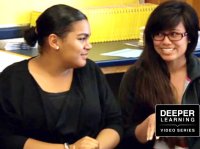A Defense of Deeper Learning: Watch What’s Working, Part 5
Your content has been saved!
Go to My Saved Content.Schools that provide students deeper learning experiences have discarded the old three R's of education -- remember, regurgitate, repeat -- and embraced new ones: Rigor, Relevance, and Relationships. Of these, the last one -- relationships -- is foundational; strong positive relationships, between teachers and students as well as among students, foster the right environment for transformational learning to take place.
Often, the difference between a student who graduates from high school and goes on to college and one who does not is a relationship with a caring adult at school who knows him well, believes in his ability to succeed, and will not let him fail. This type of student-teacher relationship is especially important in the first years of high school.
Schools can do more than simply encourage teachers to get to know their students. They can intentionally build structures into their school design that create and sustain those relationships. At Envision Schools, one way we do this is through the Advisory System.
Almost every Envision teacher serves as an advisor to 16 to 18 students, and stays with that group for two years. Advisory classes meet regularly, creating a consistent community of support that students can rely on. In Advisory, students talk about school or personal issues, work on action plans for tackling projects (like the College Success Portfolio Defense), and get help in a wide variety of areas. Students also learn how to give help and support to others.
You can watch a teacher and her advisory students in the fourth Envision Education Deeper Learning video from The Teaching Channel.
And the following video, "Advisory: Check-in and Support," offers a glimpse into the way advisories work and how they benefit both teachers and students. In the video, teacher Abby Bennedetto talks about how advisory helps her create deeper relationships with students that go beyond the academics. For her, advisories are critical: "Without the ability to form relationships with our students beyond just being their teacher, I don't think we could coax and cajole and do the work we do with them."
Advisories are so important that we provide our advisors with extensive guidelines and weekly schedules for what should be accomplished. Each Advisory Class shares common goals that promote success for all students. Specifically, students will:
Working towards these goals, the Advisory System provides an extra layer of skill-building and support, which in turn helps students achieve in their academic classes. Many adults can probably relate to this idea: all of us -- not just school-aged kids -- work and learn better when we have caring relationships around us. The students in the video illustrate the advantages nicely: they are clearly learning how to maximize the support provided by their advisory classmates.
Giving kids the experience of a learning community, as well as the skills to create one, sets them up well for the future demands of college and career, and helps them develop the academic mindsets they need to succeed.
Questions to Move Us Forward
What are your thoughts and ideas about advisory? Please share in the comments section below.
